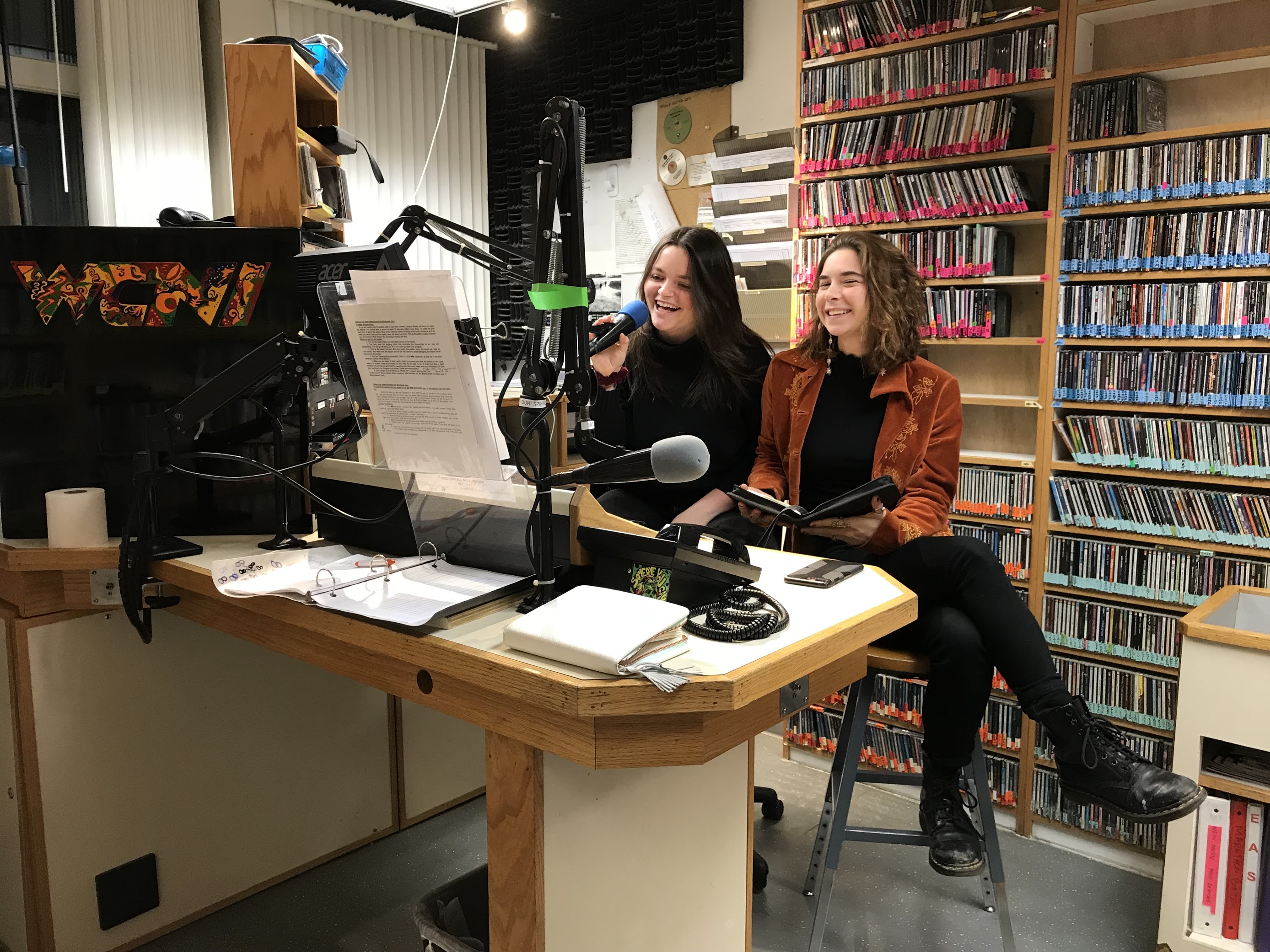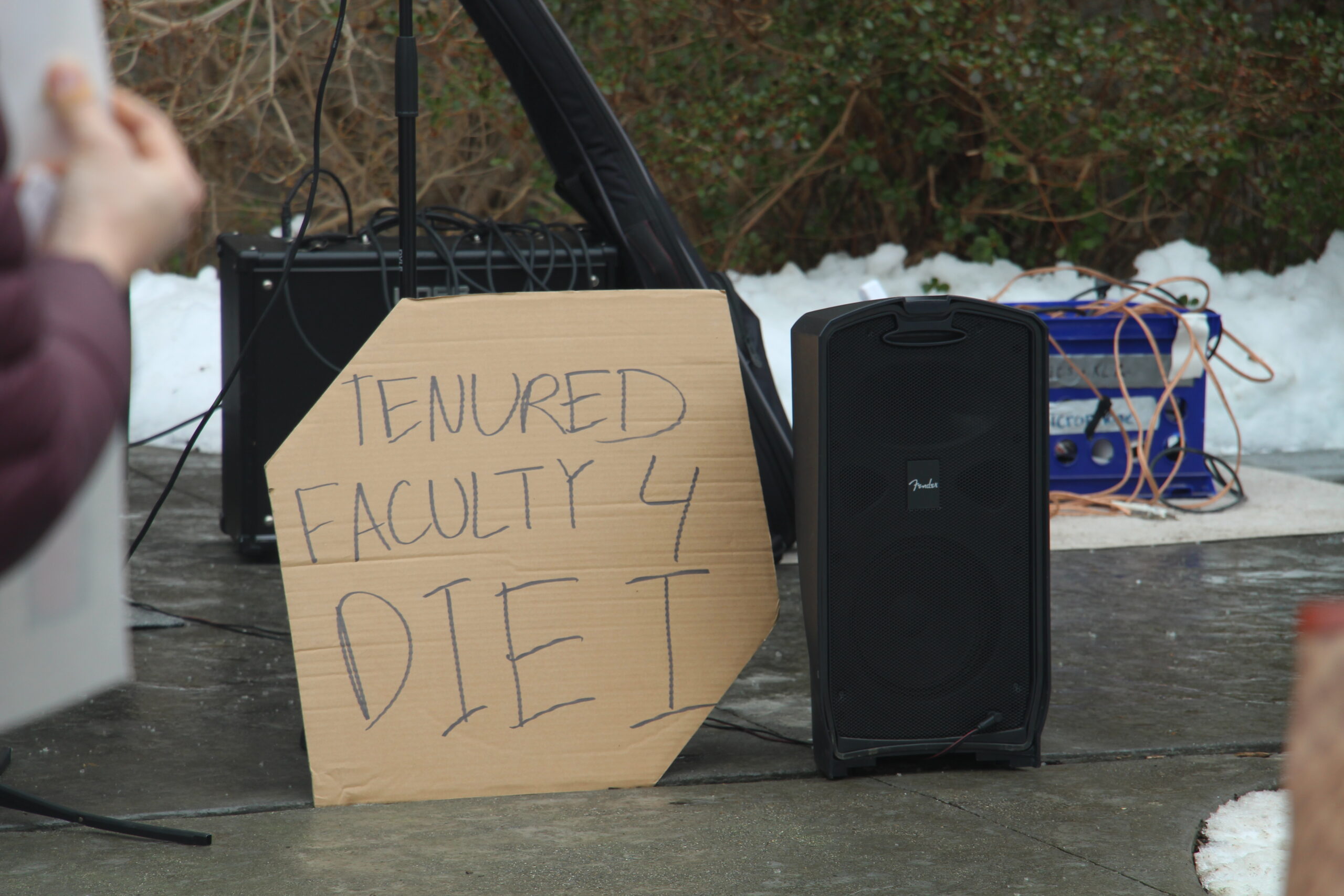I will admit that I only knew Connecticut College has a student-run radio station because my uncle, a member of the class of ’78, was part of the radio station during his time at Conn. That said, discussion of Conn’s WCNI radio station (channel 90.9, also found at wcniradio.org) appears limited on campus. Wondering if my first-year status had just limited my scope of WCNI conversation, or if WCNI really is a ghost on campus, I decided to find out more about the mysterious station.
WCNI’s headquarters is located on the right side of Cro. Or, as Samantha Weisenthal ’18, a DJ who plays music every other Tuesday with Miranda Dimase-Nordling ’18, said: you can locate the office from the music radiating out from the speakers. This proved to be true: as I opened the doors to the office, I heard music pulsing throughout the room. Immediately, my eyes were drawn to the various stickers and posters that covered the walls and doors. A brief tour revealed a back room stocked with hundreds of vinyl records and CDs. While 90.9 is best known for folk music, its vast collection of music spans all genres. But as Weisenthal put it, that “the youth prefers Spotify.” In fact, one of Weisenthal’s Spotify playlists was on in the background during my tour.
Although set in a small space, Conn’s radio station has grown over the years. An old newspaper clipping hung in the office explains that the radio station was originally created by Carol Crane ’50, and Phyll Hoffman ’51. Before my uncle, Michael Schiff, was part of WCNI—he had a weekly show that played folk and jazz music—students used to plug their radios into outlets in their dorms to listen to the station.
However, eventually WCNI became a real radio station that played music live. When Schiff was a student at Conn in the seventies, he said that members of the club used a ten watt station, which is the smallest FFC approved station. Despite this limitation, the station still thrived. Music ranging from jazz and classical to rock n’ roll was played through the turntables and sometimes cassettes. Even though the station had a limited range, not only students listened to the radio: faculty members and some locals who lived near Conn’s campus enjoyed it as well.
Fast forward a few decades and there is now a larger antenna that reaches listeners spread across a greater radius. There are now twenty DJs working at WCNI and each host has a three hour slot during which they play their music. Students dedicate time to making playlists and conducting research about new songs and albums, which helps them create suitable playlists that people will want to hear. However, Weisenthal admits that she, along with Dimase-Nordling, do not always have a planned playlist, which allows them to compose on the spot and “goof off on air” a little bit. Whether planned or improvised, music has the unique ability to inspire certain emotions in listeners that may have not been there before, Weisenthal explained.
The radio station is another comfortable and welcoming space on Conn’s campus where students can mess around with music and have fun. Dimase-Nordling goes on to say that the station is a “platform to explore.” And indeed it is. Charlie King ’18, the current student general manager and program director, said that the radio station helped him and other students go outside their comfort zone.
Although the station has expanded since its creation in the fifties, King still wants to go further. He explained in an interview that the station was very popular in the nineties and in fact never went off air—King wants to make this happen again and said that he only has five more slots he has to fill in order to have the station be live twenty-four seven. During my uncle’s time at Conn, the radio station would annually host popular bands; including artists such as Billy Joel and Bonnie Raitt. This is a tradition that King hopes to revitalize, as well.
WCNI is one of many platforms that allows students to project their opinions. My uncle considers it an “essential voice of Connecticut College.” According to King, the station gives students a chance “to get out of the [college] bubble” and have a relationship with the New London community. WCNI is not only about playing music that their listeners will enjoy, but is also a means of expression and connection to others that not all organizations possess. I know I will start tuning in to 90.9.











[…] Read more from The College Voice. […]